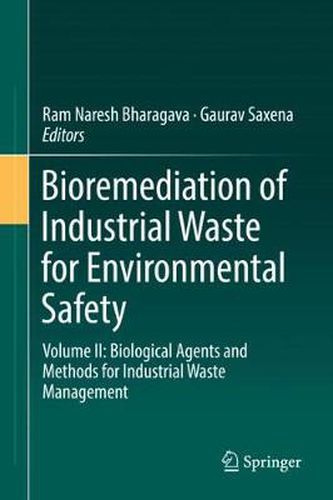Readings Newsletter
Become a Readings Member to make your shopping experience even easier.
Sign in or sign up for free!
You’re not far away from qualifying for FREE standard shipping within Australia
You’ve qualified for FREE standard shipping within Australia
The cart is loading…






This title is printed to order. This book may have been self-published. If so, we cannot guarantee the quality of the content. In the main most books will have gone through the editing process however some may not. We therefore suggest that you be aware of this before ordering this book. If in doubt check either the author or publisher’s details as we are unable to accept any returns unless they are faulty. Please contact us if you have any questions.
Achieving environmental sustainability with rapid industrialization is currently a major global challenge. Industries are the key economic drivers, but are also the main polluters as untreated/partially treated effluents from industry are usually discharged into the aquatic environment or dumped. Industrial effluents often contain highly toxic and hazardous pollutants, which cause ecological damage and present and health hazards to living beings. As such, there is a pressing need to find ecofriendly solutions to deal with industrial waste, and to develop sustainable methods for treating/detoxifying waste before it’s released into the environment. As a low cost and eco-friendly clean technology, bioremediation can offer a sustainable alternative to conventional remediation technologies for the treatment and management of industrial wastes.
This book (Volume II) describes the role of biological agents in the degradation and detoxification of organic and inorganic pollutants in industrial wastes, and presents recent bioremediation approaches for waste treatment and management, such as constructed wetlands, electro- bioremediation and nano-bioremediation, as well as microbial fuel cells. It appeals to students, researchers, scientists, industry professionals and experts in the field of microbiology, biotechnology, environmental sciences, eco-toxicology, environmental remediation and waste management and other relevant areas who are interested in biodegradation and bioremediation of industrial wastes for environmental safety.
$9.00 standard shipping within Australia
FREE standard shipping within Australia for orders over $100.00
Express & International shipping calculated at checkout
This title is printed to order. This book may have been self-published. If so, we cannot guarantee the quality of the content. In the main most books will have gone through the editing process however some may not. We therefore suggest that you be aware of this before ordering this book. If in doubt check either the author or publisher’s details as we are unable to accept any returns unless they are faulty. Please contact us if you have any questions.
Achieving environmental sustainability with rapid industrialization is currently a major global challenge. Industries are the key economic drivers, but are also the main polluters as untreated/partially treated effluents from industry are usually discharged into the aquatic environment or dumped. Industrial effluents often contain highly toxic and hazardous pollutants, which cause ecological damage and present and health hazards to living beings. As such, there is a pressing need to find ecofriendly solutions to deal with industrial waste, and to develop sustainable methods for treating/detoxifying waste before it’s released into the environment. As a low cost and eco-friendly clean technology, bioremediation can offer a sustainable alternative to conventional remediation technologies for the treatment and management of industrial wastes.
This book (Volume II) describes the role of biological agents in the degradation and detoxification of organic and inorganic pollutants in industrial wastes, and presents recent bioremediation approaches for waste treatment and management, such as constructed wetlands, electro- bioremediation and nano-bioremediation, as well as microbial fuel cells. It appeals to students, researchers, scientists, industry professionals and experts in the field of microbiology, biotechnology, environmental sciences, eco-toxicology, environmental remediation and waste management and other relevant areas who are interested in biodegradation and bioremediation of industrial wastes for environmental safety.